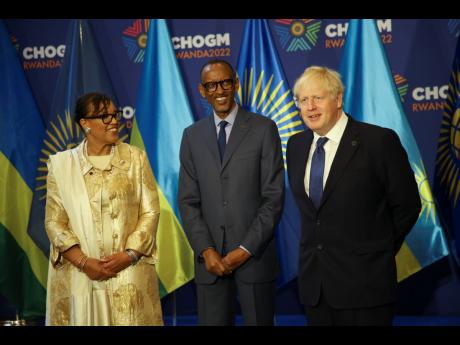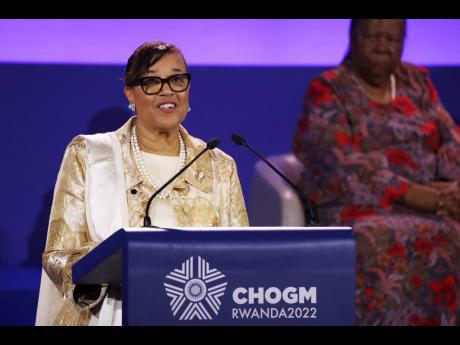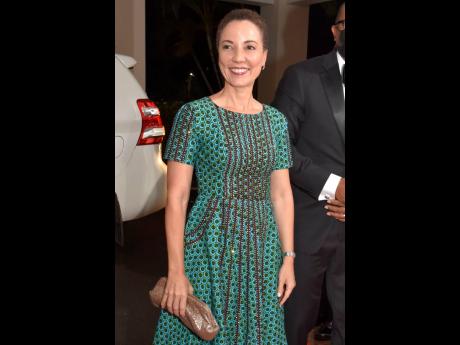SCOTLAND PREVAILS
Johnson Smith fails to topple incumbent in Commonwealth SG bid
One of the country’s most senior diplomats has pinned Kamina Johnson Smith’s loss in her bid for the post of Commonwealth secretary general (SG) on an about-turn by some African nations, allowing Baroness Patricia Scotland to continue her mandate for the next two years.
Scotland, a Dominica-born British politician who grew up in the United Kingdom, on Friday turned back the challenge of the Jamaican foreign affairs and foreign trade minister when Commonwealth heads of government voted 27-24 in Kigali, Rwanda, for her to complete a second four-year term.
Tuvalu’s Sir Iakoba Italeli also vied for the post.
The senior official, who asked not to be identified because he was not authorised to speak, told The Gleaner that until a few days ago, Johnson Smith had enough received enough commitments to secure victory in a rare challenge to a sitting secretary general.
Scotland, who was elected to the post in 2015 and took up office in London in 2016, had her first four-year term extended by two years after the COVID-19 pandemic prevented Commonwealth heads of government from meeting in 2020.
But the “game-changer”, according to the official, came when Scotland pivoted, telling leaders and diplomats that she was no longer seeking a full second term, but would instead only serve for two additional years if elected before handing over to the reins to Africa, the region next in the rotation to select a native for the post.
‘Change in strategy’
The convention has been that the secretary general role is rotated among the geographical blocs of the Commonwealth. Africa held the majority of the votes with 19, the Caribbean and Americas had 13, the Pacific 11, Asia 8, and Europe three.
“I think that there was some footwork that took place because the baroness offered herself for the two years instead of four in order to facilitate Africa coming in. That might have appealed to the African countries and that was the game-changer,” the official said on Friday.
“It is true that the numbers were very much in our favour, but there was a change in strategy. At first, the baroness was seeking four years like Jamaica and then changed midway. I think that swung some votes,” he added.
Just under a month ago, de facto Information Minister Robert Morgan had also said that Johnson Smith had reached the threshold of votes needed to secure the nod.
But on Friday, he, too, suggested that there was some last-minute shift in the decisions of some countries.
“There are things that happened that I will not speak about that caused some of the votes to shift. That’s a part of elections. When you run an election, voters will make decisions on the day that they feel is their decision to make and you have to respect that,” Morgan said during a Gleaner-hosted Twitter Space shortly after the announcement.
“When you do your canvass, over time, you will see the shifts, and you will try to reinforce your support base. Sometimes you are able to do it, sometimes you are not able to do it,” he added.
In a Gleaner interview two weeks ago, Antigua and Barbuda Prime Minister Gaston Browne hinted at a pact between Scotland and African countries which would secure her victory.
Browne, who had called Jamaica’s decision to field a candidate a “monumental error”, on Friday hailed Scotland’s reappointment.
“It was a welcome outcome from the elections held earlier today (yesterday) and we look forward to the full support of the entire Commonwealth family of nations, as we move forward in solidarity,” he said in a brief statement to The Gleaner.
In a post on social media, Scotland said that her reappointment was humbling.
“To continue to serve our family of nations is a true honour and a privilege and I will do so to the best of my ability. We will face the world’s challenges with unity and purpose,” she said.
Scotland had faced strong opposition for reappointment amid allegations of the mismanagement of the secretariat, all of which she has denied.
UK ‘vendetta’ accusations
Supporters of the former United Kingdom (UK) Labour minister and attorney general had, instead, argued that the UK had engineered Johnson Smith’s late shock bid – declared just over two months ago – charging that British Prime Minister Boris Johnson, through her candidature, had been pursuing a vendetta against Scotland.
They also expressed outrage at Johnson’s backing of one candidate at a time when the UK is supposed to be the neutral scrutiniser of the election process, claiming it was an abuse of his position and that he had compromised the UK’s role.
On Friday, the British PM rejected the idea that he had been dealt a blow, instead insisting it was “good day for democracy”.
Johnson Smith denied having any role in any such plot and has insisted that she was not a proxy candidate for the UK.
“Thanking all the countries and people who supported me in this journey! As I said to many of you – if I didn’t pull through, God wasn’t ready for me to leave Jamaica yet! Much love always, I continue to serve, and of course, sincere congratulations to Baroness Scotland. #OneLove,” she tweeted.
Prime Minister Andrew Holness called the contest “good” in extending congratulations to Scotland and said Johnson Smith ran a “distinguished and exemplary” campaign.
While Johnson Smith’s bid failed, the result has revealed a deeply divided Commonwealth under Scotland’s leadership.
The summit is set to wrap up this weekend with the issuing of a final policy communiqué.




